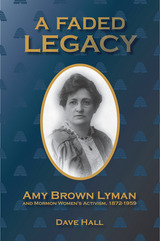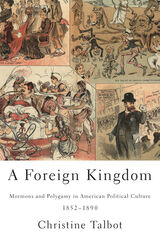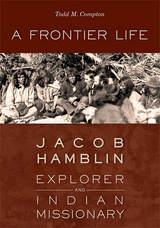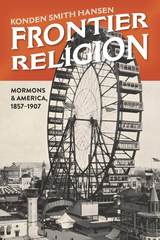114 books about Mormon Church and 5
start with F
114 books about Mormon Church and 5
114 books about Mormon Church
5 start with F start with F
5 start with F start with F

A Faded Legacy
Amy Brown Lyman and Mormon Women's Activism, 1872 - 1959
Dave Hall
University of Utah Press, 2015
To her contemporaries Amy Brown Lyman was a leader, admired for her dynamic personality, her inspiring public addresses, and especially for her remarkable vision of what Mormon women in the Relief Society could achieve. Yet today her name is barely known. This volume brings her work to light, showing how the accomplishments of Lyman and her peers benefitted their own and subsequent generations.
Placing Lyman’s story within a local and national context, award-winning author Dave Hall examines the roots and trajectory of Mormon women’s activism. Born into a polygamist family, Lyman entered the larger sphere of public life at the time when the practice of polygamy was ending and Mormonism had begun assimilating mainstream trends. The book follows her life as she prepared for a career, married, and sought meaning in a rapidly changing society. It recounts her involvement in the Relief Society, the Mormon women’s charity group that she led for many years and sought to transform into a force for social welfare, and it considers the influence of her connections with national and international women’s organizations. The final period of Lyman’s life, in which she resigned from the Relief Society amidst personal tragedy, offers insight into the reasons Mormon women abandoned their activist heritage for a more conservative role, a stance that is again evolving.
Winner of the Mormon History Association's Best First Book Award.
Placing Lyman’s story within a local and national context, award-winning author Dave Hall examines the roots and trajectory of Mormon women’s activism. Born into a polygamist family, Lyman entered the larger sphere of public life at the time when the practice of polygamy was ending and Mormonism had begun assimilating mainstream trends. The book follows her life as she prepared for a career, married, and sought meaning in a rapidly changing society. It recounts her involvement in the Relief Society, the Mormon women’s charity group that she led for many years and sought to transform into a force for social welfare, and it considers the influence of her connections with national and international women’s organizations. The final period of Lyman’s life, in which she resigned from the Relief Society amidst personal tragedy, offers insight into the reasons Mormon women abandoned their activist heritage for a more conservative role, a stance that is again evolving.
Winner of the Mormon History Association's Best First Book Award.
[more]

A Foreign Kingdom
Mormons and Polygamy in American Political Culture, 1852-1890
Christine Talbot
University of Illinois Press, 2013
The years from 1852 to 1890 marked a controversial period in Mormonism, when the church's official embrace of polygamy put it at odds with wider American culture. In this study, Christine Talbot explores the controversial era, discussing how plural marriage generated decades of cultural and political conflict over competing definitions of legitimate marriage, family structure, and American identity.
In particular, Talbot examines "the Mormon question" with attention to how it constructed ideas about American citizenship around the presumed separation of the public and private spheres. Contrary to the prevailing notion of man as political actor, woman as domestic keeper, and religious conscience as entirely private, Mormons enfranchised women and framed religious practice as a political act. The way Mormonism undermined the public/private divide led white, middle-class Americans to respond by attacking not just Mormon sexual and marital norms but also Mormons' very fitness as American citizens. Poised at the intersection of the history of the American West, Mormonism, and nineteenth-century culture and politics, this carefully researched exploration considers the ways in which Mormons and anti-Mormons both questioned and constructed ideas of the national body politic, citizenship, gender, the family, and American culture at large.
[more]

From Mission to Madness
LAST SON OF THE MORMON PROPHET
Valeen Tippetts Avery
University of Illinois Press, 1998
Brilliant and charismatic, David Hyrum Smith was a poet, painter, singer, philosopher, naturalist, and highly effective missionary for the Reorganized Church of Jesus Christ of Latter Day Saints. In this richly detailed biography, Valeen Tippetts Avery chronicles the life of the last son of Joseph Smith and his first wife, Emma. Avery draws on a large body of correspondence for details of David's life and on his poetry to reveal his personality and emotional struggles. She tells of his mental deterioration, starting with a probable breakdown early in 1870 and ending with his death in 1904 in the Northern Illinois Hospital and Asylum for the Insane in Elgin, where he had been confined for twenty-seven years.
"This is an astonishing accomplishment which not only tells the reader about a neglected historical figure, but about myriad neglected dimensions of both Mormon history and the history of religion in general." -- Jan Shipps, author of Mormonism: The Story of a New Religious Tradition
"This will stand alone as a biography of David H. Smith. . . . But it is also an insightful look at the times and environment from which the Smith family, and its ideas, emerged." -- Paul M. Edwards, author of Our Legacy of Faith: A Brief History of the Reorganized Church
"This is an astonishing accomplishment which not only tells the reader about a neglected historical figure, but about myriad neglected dimensions of both Mormon history and the history of religion in general." -- Jan Shipps, author of Mormonism: The Story of a New Religious Tradition
"This will stand alone as a biography of David H. Smith. . . . But it is also an insightful look at the times and environment from which the Smith family, and its ideas, emerged." -- Paul M. Edwards, author of Our Legacy of Faith: A Brief History of the Reorganized Church
[more]

A Frontier Life
Jacob Hamblin, Explorer and Indian Missionary
Todd M. Compton
University of Utah Press, 2013
Winner of the Juanita Brooks Prize in Mormon Studies
Frontiersman, colonizer, missionary to the Indians, and explorer of the American West, Jacob Hamblin has long been one of the most enigmatic figures in Mormon history. In this defining biography, Todd Compton examines and disentangles many of the myths and controversies surrounding Hamblin. His Grand Canyon adventures and explorations as a guide alongside John Wesley Powell are well documented, as are his roles as a missionary, cultural liaison, and negotiator to the Indian tribes of southern Utah and Arizona. Hamblin struggled in this latter role, sometimes unable to bridge the gulf between Mormonism and Indian culture. He disavowed violent conflict and ceaselessly sought peaceful resolutions where others resorted to punitive action. He strove above all for mutual understanding in the absence of conversion.
A Frontier Life provides a rich narrative that fleshes out a picture of a sometimes vilified figure, particularly in regard to his connection to the infamous Mountain Meadows Massacre, where Compton provides nuanced discussion clarifying Hamblin’s post-massacre role—he was not present at the massacre, but reported on it to both Brigham Young and military investigators. Compton’s engagement with Mormon historiography and previous Hamblin portrayals will make this work of particular interest to both scholars and students. The casual reader will take pleasure in learning of a true pioneer who lived life at the geographical, cultural, and spiritual boundaries of his era. This dramatic, entertaining biography is a truly significant contribution to Mormon history.
Winner of the Evans Biography Award, the John Whitmer Historical Society Best Biography Award, and the Francis Armstrong Madsen Best Book Award.
Frontiersman, colonizer, missionary to the Indians, and explorer of the American West, Jacob Hamblin has long been one of the most enigmatic figures in Mormon history. In this defining biography, Todd Compton examines and disentangles many of the myths and controversies surrounding Hamblin. His Grand Canyon adventures and explorations as a guide alongside John Wesley Powell are well documented, as are his roles as a missionary, cultural liaison, and negotiator to the Indian tribes of southern Utah and Arizona. Hamblin struggled in this latter role, sometimes unable to bridge the gulf between Mormonism and Indian culture. He disavowed violent conflict and ceaselessly sought peaceful resolutions where others resorted to punitive action. He strove above all for mutual understanding in the absence of conversion.
A Frontier Life provides a rich narrative that fleshes out a picture of a sometimes vilified figure, particularly in regard to his connection to the infamous Mountain Meadows Massacre, where Compton provides nuanced discussion clarifying Hamblin’s post-massacre role—he was not present at the massacre, but reported on it to both Brigham Young and military investigators. Compton’s engagement with Mormon historiography and previous Hamblin portrayals will make this work of particular interest to both scholars and students. The casual reader will take pleasure in learning of a true pioneer who lived life at the geographical, cultural, and spiritual boundaries of his era. This dramatic, entertaining biography is a truly significant contribution to Mormon history.
Winner of the Evans Biography Award, the John Whitmer Historical Society Best Biography Award, and the Francis Armstrong Madsen Best Book Award.
[more]

Frontier Religion
Mormons and America, 1857–1907
Konden Smith Hansen
University of Utah Press, 2019
At the 1893 Columbian Exposition in Chicago, Mormons were deliberately excluded from one of the main attractions, the Parliament of Religions. Organizers believed that Mormonism, with its connections to polygamy, did not merit a place alongside other world religions being showcased for the similar ways in which they inspired people to follow God. At the same time, however, Americans who had long shown hatred or distrust toward their Mormon neighbors had begun to see Mormonism in a different light. Underlying this new view of Mormonism was a rapidly developing belief in America’s fading western frontier as a place linked to core American values such as self-reliance, personal freedom, and democratic rule. With a unique history intimately tied to the frontier, Mormonism began to be seen less as something outside America, and more as a faith closely associated with the country’s most important principles.
In Frontier Religion Konden Smith Hansen examines the dramatic influence these perceptions of the frontier had on Mormonism and other religions in America. Endeavoring to better understand the sway of the frontier on religion in the United States, this book follows several Mormon-American conflicts, from the Utah War and the antipolygamy crusades to the Reed Smoot hearings. The story of Mormonism’s move toward American acceptability represents a larger story of the nation’s transition to modernity and the meaning of religious pluralism. This book challenges old assumptions and provokes further study of the ever changing dialectic between society and faith.
In Frontier Religion Konden Smith Hansen examines the dramatic influence these perceptions of the frontier had on Mormonism and other religions in America. Endeavoring to better understand the sway of the frontier on religion in the United States, this book follows several Mormon-American conflicts, from the Utah War and the antipolygamy crusades to the Reed Smoot hearings. The story of Mormonism’s move toward American acceptability represents a larger story of the nation’s transition to modernity and the meaning of religious pluralism. This book challenges old assumptions and provokes further study of the ever changing dialectic between society and faith.
[more]
READERS
Browse our collection.
PUBLISHERS
See BiblioVault's publisher services.
STUDENT SERVICES
Files for college accessibility offices.
UChicago Accessibility Resources
home | accessibility | search | about | contact us
BiblioVault ® 2001 - 2024
The University of Chicago Press









